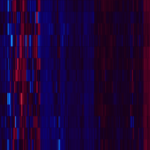Lien vers Pubmed [PMID] – 33034553
Lien DOI – 10.1099/mgen.0.000447
Microb Genom 2020 Oct; ():
Thiomonas bacteria are ubiquitous at acid mine drainage sites and play key roles in the remediation of water at these locations by oxidizing arsenite to arsenate, favouring the sorption of arsenic by iron oxides and their coprecipitation. Understanding the adaptive capacities of these bacteria is crucial to revealing how they persist and remain active in such extreme conditions. Interestingly, it was previously observed that after exposure to arsenite, when grown in a biofilm, some strains of Thiomonas bacteria develop variants that are more resistant to arsenic. Here, we identified the mechanisms involved in the emergence of such variants in biofilms. We found that the percentage of variants generated increased in the presence of high concentrations of arsenite (5.33 mM), especially in the detached cells after growth under biofilm-forming conditions. Analysis of gene expression in the parent strain CB2 revealed that genes involved in DNA repair were upregulated in the conditions where variants were observed. Finally, we assessed the phenotypes and genomes of the subsequent variants generated to evaluate the number of mutations compared to the parent strain. We determined that multiple point mutations accumulated after exposure to arsenite when cells were grown under biofilm conditions. Some of these mutations were found in what is referred to as ICE19, a genomic island (GI) carrying arsenic-resistance genes, also harbouring characteristics of an integrative and conjugative element (ICE). The mutations likely favoured the excision and duplication of this GI. This research aids in understanding how Thiomonas bacteria adapt to highly toxic environments, and, more generally, provides a window to bacterial genome evolution in extreme environments.






